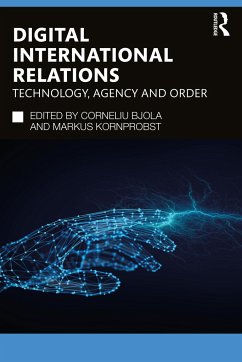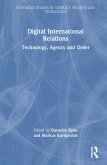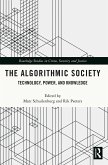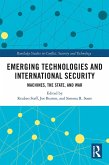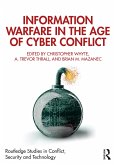This book analyses how digital transformation disrupts established patterns of world politics, moving International Relations (IR) increasingly towards Digital International Relations.
This volume examines technological, agential and ordering processes that explain this fundamental change. The contributors trace how digital disruption changes the international world we live in, ranging from security to economics, from human rights advocacy to deep fakes, and from diplomacy to international law. The book makes two sets of contributions. First, it shows that the ongoing digital revolution profoundly changes every major dimension of international politics. Second, focusing on the interplay of technology, agency and order, it provides a framework for explaining these changes. The book also provides a map for adjusting the study of international politics to studying International Relations, making a case for upgrading, augmenting and rewiring the discipline. Theory follows practice in International Relations, but if the discipline wants to be able to meaningfully analyse the present and come up with plausible scenarios for the future, it must not lag too far behind major transformations of the world that it studies. This book facilitates that theoretical journey.
This book will be of much interest to students of cyber-politics, politics and technology, and International Relations.
This volume examines technological, agential and ordering processes that explain this fundamental change. The contributors trace how digital disruption changes the international world we live in, ranging from security to economics, from human rights advocacy to deep fakes, and from diplomacy to international law. The book makes two sets of contributions. First, it shows that the ongoing digital revolution profoundly changes every major dimension of international politics. Second, focusing on the interplay of technology, agency and order, it provides a framework for explaining these changes. The book also provides a map for adjusting the study of international politics to studying International Relations, making a case for upgrading, augmenting and rewiring the discipline. Theory follows practice in International Relations, but if the discipline wants to be able to meaningfully analyse the present and come up with plausible scenarios for the future, it must not lag too far behind major transformations of the world that it studies. This book facilitates that theoretical journey.
This book will be of much interest to students of cyber-politics, politics and technology, and International Relations.
'This book breaks new ground at the crossroads of International Relations Theory and Technology. Comprehensive, theoretically original, and conceptually sophisticated, yet highly accessible, the book thoroughly describes and explains the digital revolution's broad and profound disruptive impact on international politics, human and algorithmic agency, and world order. Equally important, it will inspire new ways to theorize and research the rapidly and genuinely reconceptualized discipline of Digital International Relations.'
Emanuel Adler, Professor Emeritus of Political Science, Bronfman Chair Emeritus of Israeli Studies, University of Toronto, Canada
'This edited volume furthers the debate on digitalization and digital technologies in international relations, exploring a range of themes and issues that shape how world politics is conducted in years to come. The book brings together key scholars and insightful conversations, making a much-needed move to begin addressing what 'the digital' means for theories and practices of international relations.'
Rebecca Adler-Nissen, University of Copenhagen, Denmark
Emanuel Adler, Professor Emeritus of Political Science, Bronfman Chair Emeritus of Israeli Studies, University of Toronto, Canada
'This edited volume furthers the debate on digitalization and digital technologies in international relations, exploring a range of themes and issues that shape how world politics is conducted in years to come. The book brings together key scholars and insightful conversations, making a much-needed move to begin addressing what 'the digital' means for theories and practices of international relations.'
Rebecca Adler-Nissen, University of Copenhagen, Denmark

